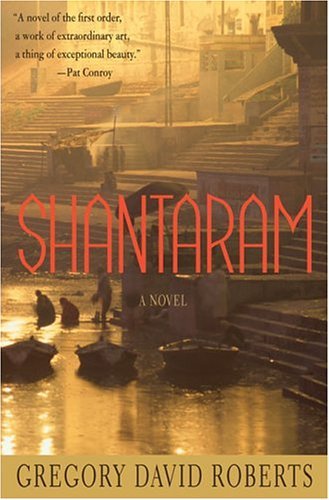Shantaram, by Gregory David Roberts, is one of my all-time favorite books.
 It’s the story of an escaped Australian convict and former heroin addict, who makes his way to Bombay in the mid-1980s, lives and works as a doctor in a slum, spends three months in an Indian prison, gets involved with the local mafia, falls in and out of love, and fights the war in Afghanistan. And it’s based on the author's life – aka kinda TRUE!
It’s the story of an escaped Australian convict and former heroin addict, who makes his way to Bombay in the mid-1980s, lives and works as a doctor in a slum, spends three months in an Indian prison, gets involved with the local mafia, falls in and out of love, and fights the war in Afghanistan. And it’s based on the author's life – aka kinda TRUE!I read Shantaram for the first time in summer 2008 (my first summer in DC!), and I knew almost immediately that it would become one of my most-loved books, due for multiple re-readings. Since then, I’ve recommended it a lot, thought about it sometimes, and finally got my hands on it again about a month ago. On a sunny warm evening, I sat down on my stoop, opened it up the 936-page block of gold, and immediately got SO excited to read it again!
Seriously, I challenge you to read the first page of this book and not want to read the whole thing. (You can read the first chapter here).
- I was a revolutionary who lost his ideals in heroin, a philosopher who lost his integrity in crime, and a poet who lost his soul in a maximum security prison. When I escaped from that prison, over the front wall, between two gun towers, I became my country’s most wanted man. Luck ran with me and flew with me to India, where I joined the Bombay mafia. I worked as a gunrunner, a smuggler, and a counterfeiter. I was chained on three continents, beaten, stabbed and starved. I went to war. I ran into the enemy guns. And I survived, while other men around me died. They were better men than I am, most of them; better men whose lives were crunched up in mistakes, and thrown away by the wrong second of someone else’s hate, or love, or indifference. And I buried them, too many of those men, and grieved their stories and their lives into my own.
And a lot of it is about love – some romantic (Lin and Karla), some filial (Lin and Khader), but mostly friendship (Prabhakar, Abdullah, Didier, etc. etc. etc.):
- “At first, when we truly love someone, our greatest fear is that the loved one will stop loving us. What we should fear and dread, of course, is that we won’t stop loving them, even after they are dead and gone. For I still love you with the whole of my heart. I still love you. And sometimes, my friend, the love that I have and can’t give to you, crushed the breast from my chest. Sometimes, even now, my heart is drowning in a sorrow that has no stars without you, and no laughter, and no sleep.”
- "With respect, Shantaram is not an autobiography, it’s a novel. If the book reads like an autobiography, I take that as a very high compliment, because I structured the created narrative to read like fiction but feel like fact. I wanted the novel to have the page-turning drive of a work of fiction but to be informed by such a powerful stream of real experience that it had the authentic feel of fact.
- "As the kilometers wound past, as the hundreds of people in those slums became thousands, and tens of thousands, my spirit writhed....Still, that first encounter with the ragged misery of the slum, heartbreak all the way to the horizon, cut into my eyes. For a time, I ran into the knives."
I'm a little bit torn right now, because I want to tell you everything, but I don’t want to give anything away…so I’ll stop myself and just say READ THIS NOW. The only downside is that the book in hard-cover is too big to fit in my purse.


